It’s a grave cold night in a city that knows how to keep its secrets. Alleys fill with mist. A flashlight casts a ghostly glow in a back office of a supposedly-deserted government building. Figures with obscured faces meet in the shadows of a parking garage. This file doesn’t exist, and I’m certainly not handing it to you now. In fact, this building won’t be here tomorrow. Besides—who’s to say you haven’t dreamed this entire conversation?
Two great truth-seekers arose from twentieth-century fiction: the noir detective and the spy. They live in similar worlds: murky and high-contrast, full of suspicion and distrust, peeling back the skin of consensus reality to reveal the worms beneath. The spy and detective have their differences, though. Most of the time, you can trust the detective. She’s here to right wrongs, to find murderers and bring them to justice, or at least try. The spy’s motives are murkier. It’s unclear whether she’s out to save anyone except herself.
The detective believes in right—she believes she can make a difference, no matter how small. The spy has seen the other side. The spy knows that good’s the word on the survivor’s tongue. She’s sacrificed her last inch of hope; she’s seen the darkness, and knows its name.
But while detectives and the world of science fiction and fantasy are on intimate terms—the genre’s full of PIs guiding readers through fantastic realms, seeking truths and dispensing the occasional wisecrack—the fantastical spy’s a rarer being. When she surfaces, she leaves an impression before she disappears into the night.
Writing The Witch Who Came in from the Cold, we drew on a rich tradition of weird spies from a range of media, but here are a few books you might seek out if you’re looking to check our sources.
Declare by Tim Powers
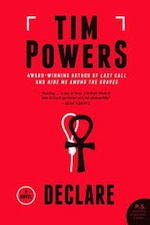 The less known about a Tim Powers novel going in, the better, so may I suggest stopping now and reading this book if you haven’t already? Declare is a tale of twentieth century weirdness that follows a world of secret knowledge struggling to reinvent itself in the face of deeper and more secret knowledge. Catching hosts of strange-but-true details of history in the net of its plot, Declare melds the plausibly deniable symbolism and grandiose, grotesque schemes of magic and espionage.
The less known about a Tim Powers novel going in, the better, so may I suggest stopping now and reading this book if you haven’t already? Declare is a tale of twentieth century weirdness that follows a world of secret knowledge struggling to reinvent itself in the face of deeper and more secret knowledge. Catching hosts of strange-but-true details of history in the net of its plot, Declare melds the plausibly deniable symbolism and grandiose, grotesque schemes of magic and espionage.
The Laundry Files by Charles Stross
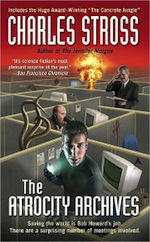 Charles Stross’ Laundry Files confront the worlds of magic and covert espionage with the less mysterious, but far more opaque, soul-sucking domain of civil service bureaucracy. Here the spies and monsters are both on the table, unpacked with excellent humor and set off against slide decks, action items, matrix management, and obscure data filing systems. Declare and The Laundry Files both start from the LeCarre premise that spies, mystical or otherwise, are part of an organization—but Declare supposes the organization in question is competent, while the Laundry Files suppose that it looks a lot more like the kind of organizations we all encounter in daily life. Which only adds to the horror.
Charles Stross’ Laundry Files confront the worlds of magic and covert espionage with the less mysterious, but far more opaque, soul-sucking domain of civil service bureaucracy. Here the spies and monsters are both on the table, unpacked with excellent humor and set off against slide decks, action items, matrix management, and obscure data filing systems. Declare and The Laundry Files both start from the LeCarre premise that spies, mystical or otherwise, are part of an organization—but Declare supposes the organization in question is competent, while the Laundry Files suppose that it looks a lot more like the kind of organizations we all encounter in daily life. Which only adds to the horror.
The Miles Vorkosigan books by Lois McMaster Bujold
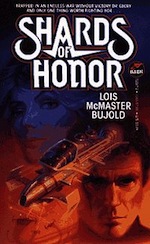 Bujold’s brilliant science fictional Ruritanias enable some of my favorite intrigue in genre. Miles Naismith Vorkosigan, Bujold’s hero, has a weak body but a brilliant mind—too brilliant for his own good, in fact. Miles’ fast footwork leads him into mission after mission for Barrayaran intelligence, as a highly placed secret agent-cum-interstellar mercenary admiral. It all makes sense, and trust me, if you don’t know these books already, you’re in for a hell of a ride. Start at the beginning with The Warrior’s Apprentice, or, really, with any of her books. Bujold deserves all the praise she receives, but there’s one talent of hers I never appreciated until I was six books into writing my own series: she’s one of the best on-boarders in the business.
Bujold’s brilliant science fictional Ruritanias enable some of my favorite intrigue in genre. Miles Naismith Vorkosigan, Bujold’s hero, has a weak body but a brilliant mind—too brilliant for his own good, in fact. Miles’ fast footwork leads him into mission after mission for Barrayaran intelligence, as a highly placed secret agent-cum-interstellar mercenary admiral. It all makes sense, and trust me, if you don’t know these books already, you’re in for a hell of a ride. Start at the beginning with The Warrior’s Apprentice, or, really, with any of her books. Bujold deserves all the praise she receives, but there’s one talent of hers I never appreciated until I was six books into writing my own series: she’s one of the best on-boarders in the business.
The Lymond Chronicles by Dorothy Dunnett
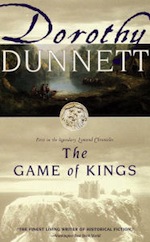 The past’s not just another country, it’s a whole damn other world. Dorothy Dunnett’s hero, Francis Crawford of Lymond, spends much of his titular series as a sort of freelance intelligence agent, frequently in Scotland’s service, but often in the service of Scotland’s greater interests regardless of whatever Scotland’s current government might have to say about the subject. Lymond swings between professions—fugitive, mercenary captain, nation-builder—but he’s always a bit of a spy. It’s a stretch including him on this list, but historical fiction taken this seriously has as much world building as any work of fantasy or science fiction—and once you add in the peculiarities of Lymond’s world (the separate order of geniuses to which he and a few select other characters belong, the Dame de Doubtance, etc.), we’re practically in another universe altogether.
The past’s not just another country, it’s a whole damn other world. Dorothy Dunnett’s hero, Francis Crawford of Lymond, spends much of his titular series as a sort of freelance intelligence agent, frequently in Scotland’s service, but often in the service of Scotland’s greater interests regardless of whatever Scotland’s current government might have to say about the subject. Lymond swings between professions—fugitive, mercenary captain, nation-builder—but he’s always a bit of a spy. It’s a stretch including him on this list, but historical fiction taken this seriously has as much world building as any work of fantasy or science fiction—and once you add in the peculiarities of Lymond’s world (the separate order of geniuses to which he and a few select other characters belong, the Dame de Doubtance, etc.), we’re practically in another universe altogether.
Stations of the Tide by Michael Swanwick
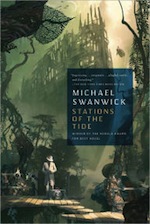 Like the characters at its core, Swanwick’s novel transforms before the reader’s eyes. Is it a detective story masquerading as a spy story? Vice versa? Does it start as one and become the other? Is it a story of magic, or religion, or science, or all of these at once? Hidden agendas are plumbed; power is used sparingly, viciously, unfairly; secrets are revealed and concealed, and the world changes.
Like the characters at its core, Swanwick’s novel transforms before the reader’s eyes. Is it a detective story masquerading as a spy story? Vice versa? Does it start as one and become the other? Is it a story of magic, or religion, or science, or all of these at once? Hidden agendas are plumbed; power is used sparingly, viciously, unfairly; secrets are revealed and concealed, and the world changes.
Originally published in January 2016 as part of our Five Books series.
Max Gladstone has been thrown from a horse in Mongolia, drank almond milk with monks on Wudang Shan, and wrecked a bicycle in Angkor Wat. He is one of the authors of The Witch Who Came in From the Cold, a collaborative fantasy spy series from Serial Box. Max is also the author of the Craft Sequence novels, about undead gods and skeletal law wizards. Max fools everyone by actually writing novels in the coffee shops of Davis Square in Somerville, MA. His dreams are much nicer than you’d expect.










What a great list! Every one of those books and series is among my favorites. (And it also reminds me I must try to pry Declare back from the friend I loaned it to last summer.)
This list reminds me that I still haven’t got round to Declare…
Declare remains one of the few books I am willing to list when asked “What is your favorite book?” It is beautiful prose, great pacing, and all this secret history of the world stuff that I know is just bull$#!+ but works so well. I’ve read all but the Dunnett, so that’s moving to my must-have list.
Other spies: Don’t forget Keith Laumer’s Retief: ostensibly a diplomat, but all the derring-do of Bond. Some of the funniest SF out there (John Scalzi’s diplomatic gone-wrong novel The Android’s Dream makes a good pairing). Elizabeth Bear’s Carnival is a good choice too. Neal Stephenson’s Cryptonomicon is another good choice, although not really SF.
Holy crap! Lymond showed up on Tor.com (beyond a slight reference in the Rothfuss re-read)!
Dunnett is absolutely one of my favourite authors. The way she used historical accuracy and mixed in superlative character building and continent-wide suspense and intrigue across two epic series (The House of Niccoló is set before Lymond) astounds me every time I’ve read them.
Thank you Max!
Rudi from the Fractured Europe series by Dave Hutchinson (Europe in Autumn, etc).
Ken from Malka Older’s Infomocracy.
Looks like my TBR list just got 5 books longer
Hey, if Lymond counts, so should Stephen Maturin.
I notice the lead characters here spend little if any time on the primary duty of a spy to convince or bribe someone into giving them information. Count Vorkosogian especially is an agent and saboteur. All excellent books by the way. I am surprised
Love both the Swanwick and Powers novels. Have never been able to get more than 30 pages into a Bujold book. Her writing just doesn’t engage me.
If you’re going to read Declare, do yourself a favor and read Kipling’s Kim too. A working knowledge of the real life Kim Philly (yes, nicknamed after the Kipling character) also adds to the enjoyment.
But I think my favorite weird spy is the vacuum salesman turned agent James Wormold from Graham Greene’s Our Man in Havana. The absurdities of the Great Game have seldom been funnier.
@7
For certain we should include Stephen Maturin from the Patrick O’Brien Aubrey/Maturin series. And he does do the covert bribing of neutrals to stay neutral, change sides or whatever along with misinformation and old fashioned proper spying.
And the books are often very funny as well.
Amanda Downum’s Isyllt the Necromancer–The Drowning City is first. Politics and double-crosses everywhere you look.
I’m also thinking that the Butcher, from Delany’s Babel-17, should count.
Its not quite the same, but I couldn’t help but think of Hugh Laurie’s _The Gunseller_ when I read this. Actors can create some of the most believable dialog in any genre.
Amberlough‘s gotta be on this list too. What a book!
And @10, totally agree with you on Kim. But I had no idea Kim O’Hara was based on a real person… that’s pretty neat.
Kangaroo from Curtis Chen’s Kangaroo series also.
Any discussion of fantasy spies needs to include Phèdre nó Delaunay from Kushiel’s Dart by Jacqueline Carey. Sex, intrigue, sex, fallen angels, more sex, and political machinations. There are numerous interesting, powerful women with agency. Carey’s language is gorgeously lush. It’s a book worth taking time over. The follow-up books (are which there are several) are less focused on Phèdre’s career as a spy, but they are definitely worth reading.
yes, lymond and miles! yes, maturin! i guess any post—and its readers—that includes these guys all in one place i’d better pay attention to, and “read” the others (i just foud Declare in audiobook on hoopla…)!
Dorothy Dunnett! It took some patience the first 100 pages or so, but in retrospect I realized that it really was brilliant from the first page, you just have to relax and let it wash over you and not be in a hurry because Dunnett is for savoring. The beautiful and evocative writing starts off good and ends up stunning. And then there was Lymond – so aloof and insufferable at first, and speaking in untranslated medieval French, Latin, Spanish and snippets of poems and riddles. I’ve always been surprised that I stuck with him, but it turned out he had his reasons, and of course for me he became the hero to end all heroes, and Dunnett is the author who puts most others to shame.
These books are one of the highlights of my life, I am always in the midst of yet another re-read in between other books because nothing ever lives up to Dunnett for me. I could never get tired of her beautiful writing, and there are new revelations with each re-read. I’ve never loved a book (or series) so much, and never learned so much from any other author. Her history research is phenomenal and the real history is interwoven so meticulously with her fictional characters that it’s hard to believe they never existed. I could go on and on about the dazzling action sequences, battles on land and sea, the evocative descriptions of places, the greatest sword fight ever written, the fascinating and multi-dimensional characters and events (real and fictional), the humor, one of the most nefarious villains in fiction, the extraordinary historical accuracy and detail and emotional roller coastal of it all. But you should just read Game of Kings, stick with it until you’re hooked, and know that it only gets better and better through six books until you dissolve in a puddle of exhausted tears because the glorious adventure is at its end. And then you start over again at the beginning like most Dunnett readers.